Listening to your favorite song might relax you. You might even find yourself taking a little nap in your chair whenever a mellow acoustic tune comes up on your playlist. If you feel this way, there might be a scientific reason for it. Music can heavily impact the way we feel, and in some cases, music can even help to promote better sleep.
Not all music is suited to the task, and the way you listen to music at bedtime can play a role in how effective soothing tunes can be to get you snoozing.
Here’s what you need to know about incorporating music into your bedtime routine, as well as other tips for what you can do to improve the quality of your sleep.
Can Listening to Music While Sleeping Improve Sleep Quality?
Everything you hear is capable of producing a signal within your brain. That’s why mothers often have a profound and immediate reaction to the sound of their babies crying. It’s also why certain loud sounds may signal to your brain that danger is imminent.
Music will produce physical sensations, and these sensations will impact the way you feel, even in sleep. Dance music might make you feel motivated or energetic. Slow, eerie music may creep you out. Soothing music may help you relax. It’s as simple as that.
How Listening to Music While Sleeping Affects Hormones
Soothing music can actually help to reduce the amount of cortisol within your body. Cortisol is a hormone that the body produces in response to stress. Cortisol can make you feel tense or anxious. It also has a negative effect on energy levels and metabolism.
When you listen to music that speaks to you, your body releases a hormone called dopamine. Dopamine is a happy hormone that the body releases after a great workout, during a really delicious meal, or during intimacy. It’s that flood of warm, fuzzy goodness that makes you happy you’ve done something. In essence, it’s the exact opposite of cortisol.
When dopamine is present, it’s easier to relax. You feel good. Your muscles may feel a little more limber. Many people experience a reduction in the sensation of pain when dopamine is present. It does all sorts of things that almost feel like nature’s version of magic. Anything you do feels better and easier with dopamine coursing through your body, including trying to get to sleep.
How Listening to Music While Sleeping Affects the Nervous System
The nervous system is complicated. It’s divided into two parts and six divisions, with each playing a different role in your body’s responses and ability to perceive sensation. Music can affect the autonomic nervous system, which is the division of the nervous system that manages unconscious processes, like your heartbeat, respiration, and the movement of your digestive system.
Positive stimulation from music can send cues to these systems that they need to slow down and enter a relaxed state. You might find it easier to breathe deep, slow, calming breaths if you’re listening to calming music while you’re all swaddled up for bed.
How Listening to Music While Sleeping Affects Your Environment
Music can drown out other sounds, which is one of its greatest benefits. If you live in a city or in close quarters with your neighbors, the surrounding noise may disrupt your sleep. Music creates a sonic blanket that sits overtop of those noises, causing them to blend in or fade away. Sudden or abrupt noises may be less jarring if they’re hidden beneath music.
Music can also make you feel better about laying down at night. Sleep problems often beget more sleep problems. You might crawl into bed with a negative mindset if you haven’t been able to get restful sleep in the past few days. This makes bed a stressful place that you don’t want to be in. When you’re wound up, it’s even harder to get to sleep.
Music can help make the experience of getting into bed a little more pleasant. Instead of obsessing about falling asleep or focusing on your frustration with the lack of sleep you’ve been getting, you can focus on the music and let it transport you to a better mindset.
How Should You Listen to Music While Sleeping?
Listening to music while sleeping isn’t the same as listening to music while commuting, cleaning the house, or working out. When you’re awake and alert, you’ll easily adapt to your music. You can skip songs and adjust the volume. You can also better manage your own comfort.
When you’re asleep, you’re not in control of what’s going on. You should approach your bedtime soundscape with a plan that will allow you to remain comfortably asleep through the night. After all, it defeats the purpose if your music wakes you up or your headphones become a tangled mess.
Listen in the Open Air
You shouldn’t wear headphones when you sleep. The cord can get tangled up around your throat; you can roll over and unplug them from your device, or worse, yank your device with you.
It’s also a really bad idea to sleep with those very expensive wireless earbuds in your ears. They’re really small. If they come out while you’re asleep, they can easily get lost. They can roll behind or under the bed. They can get wrapped in your sheets and accidentally tossed in the washing machine. They can also disappear into the abyss that is the back of your headboard. Don’t risk it — it’s a really expensive mistake to make.
Listening just from external speakers eliminates all of these risks. Just play your music through a Bluetooth speaker or directly from your device while you’re asleep.
Find a Suitable Volume
You want the music to be loud enough for you to hear, but not so loud that you feel compelled to engage with it. It’s an aural background for your sleeping experience, not a main event. It may take some trial and error to find a volume level that you’re comfortable with.
It may help to look at it from this perspective: the best volume to play your music at is the volume where it sounds like it might be coming from your neighbor’s place. You want the music to be ambient and not necessarily distinct.
Create a Predictable Playlist
Hard, heavy, industrial, or aggressive music doesn’t ordinarily make for a great bedtime playlist. Neither does dance music or techno. Folk, jazz, light blues, coffeehouse music, acoustic indie, classical, ambient, and lo-fi music are better suited to the occasion. Any music made specifically to be used for meditation or yoga workouts will also perfectly fit the bill.
Put together a sleep playlist that lasts at least a few hours. The music doesn’t need to play throughout the entire duration of your sleep, but it should play long enough for your brain and body to reach deep sleep.
Avoid including songs that get stuck in your head or songs you can’t help but sing along to. You don’t want to engage with the music at all. Instrumental music with a slower tempo is always going to be your best bet. There’s nothing to sing along to, and there’s no catchy beat to inspire you to tap your toes or fingers.
Choose songs you’ve already heard dozens of times. If your brain is very familiar with the music, it won’t feel compelled to explore it. It will wash over you like the normal noises you hear at night, like your house creaking or your family getting up to use the restroom at night.
Never use shuffle or random features, and don’t use playlists created by someone else. You want your complete control of your music selection and order to remain and place while you’re asleep.
Can You Use Music as White Noise?
Low tempo music at a very low volume is functionally the same as white noise. If you use bedtime white noise as a soothing technique or to prevent nighttime tinnitus, music might be a pleasant alternative to soft static noises or the whooshing sound of a box fan.
Do Ambient Sleep Tracks Work the Same as Music?
Listening to music while sleeping is the same as listening to ambient sleep tracks. Both serve the exact same purpose. If you find relaxing nature noises or gentle soundscapes specifically for sleep to be effective, you don’t have to listen to real music. Do what feels comfortable for you.
Are There Other Ways To Promote Deep Sleep?
Listening to music while sleeping can work to promote deep sleep, but your best bet is to maximize your success by combining several bedtime strategies to help you effortlessly snooze.
Living a Healthier Lifestyle
Living a healthy lifestyle will improve almost every aspect of your life. Reducing your stress level, mindful meal choices, increasing exercise, and setting aside an adequate amount of time for sleep will encourage your body to cooperate when bedtime rolls around. You’ll be nourished, relaxed, comfortable, and ready to get your eight hours of uninterrupted sleep.
Deep Touch
Touch and gentle pressure can help to reduce feelings of anxiety. That’s what our Sleep Pod is designed to do. The Sleep Pod acts as a little cocoon. The material is soft and it stretches in four directions.
When you climb into your Sleep Pod and settle in, gentle compression all over you body can soothe you both mentally and emotionally. You’ll feel safe and secure in your pod.
The Sleep Pod classic has an opening at the bottom to allow you to poke one foot out for temperature regulation. The Sleep Pod Move allows you to pop both feet out and walk short distances if necessary (in other words, yes, you can still get to the kitchen for your midnight glass of water).
Aromatherapy
Like music, aromatherapy works to stimulate your mind and body in positive ways. Aromatherapy uses pleasant scents to stimulate the olfactory system, which then relays that information to your limbic system. Your limbic system is responsible for regulating your emotions. In layman’s terms, scents can make you feel good.
If you find a scent that relaxes you, try placing an aromatherapy diffuser on your bedside table. Lay down, breathe deep, and inhale your favorite calming fragrance. Focus on the way it makes you feel and melt right into sleep.
Keeping the Room Cool
The ideal sleeping temperature is between 60 degrees and 67 degrees Fahrenheit. If your room is too hot or too cold, this can have a negative impact on the way you sleep. Set your thermostat to an appropriate temperature at night and choose bedding that’s warm enough to be comforting, but not so heavy that it makes you feel hot in the middle of the night.
Conclusion
At Hug Sleep, we understand the importance of restful sleep. Any tool that works for you is a tool worth using.
Whether it’s music, white noise, aromatherapy, or simply changing the thermostat, positive changes will help to improve your ability to reach a meaningful deep sleep state where your body can fully recharge.
We’re always here to back up your efforts with a hug.
Sources
Chronic stress puts your health at risk | Mayo Clinic
[Dopamine: not just a neurotransmitter] | PubMed
Autonomic Nervous System (ANS) Division and Functions | Simply Psychology


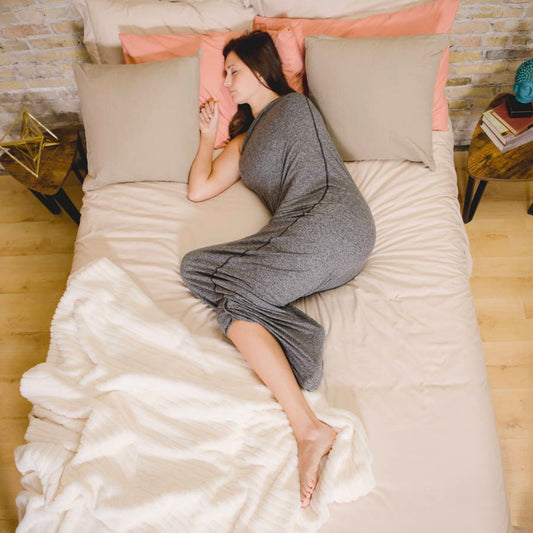
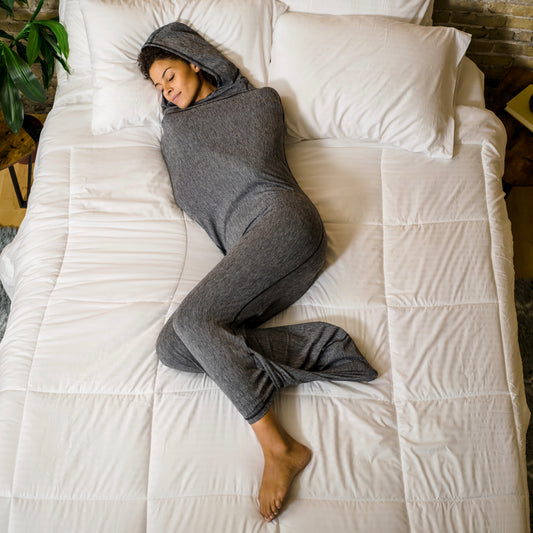
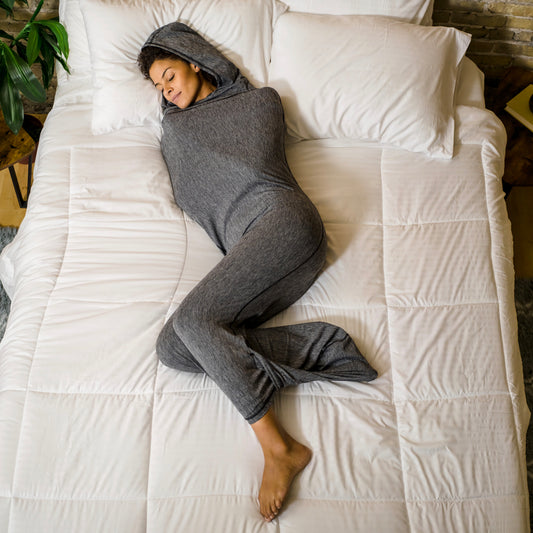
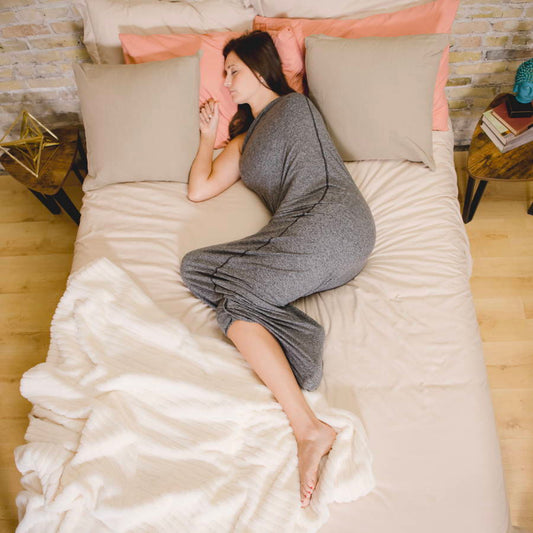
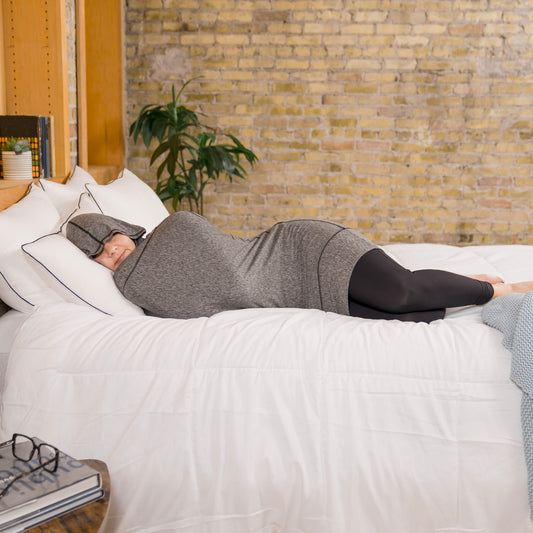
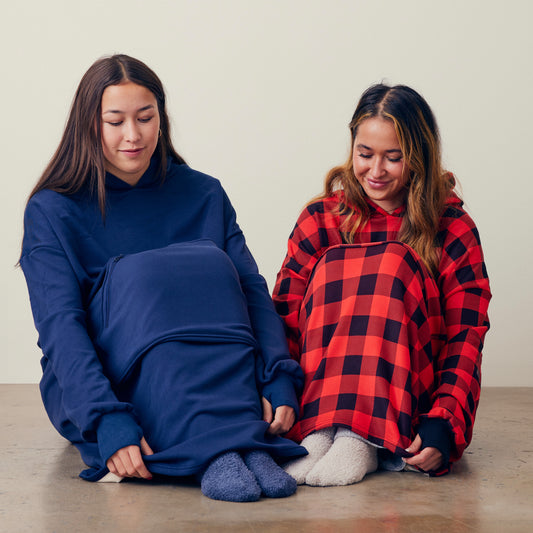
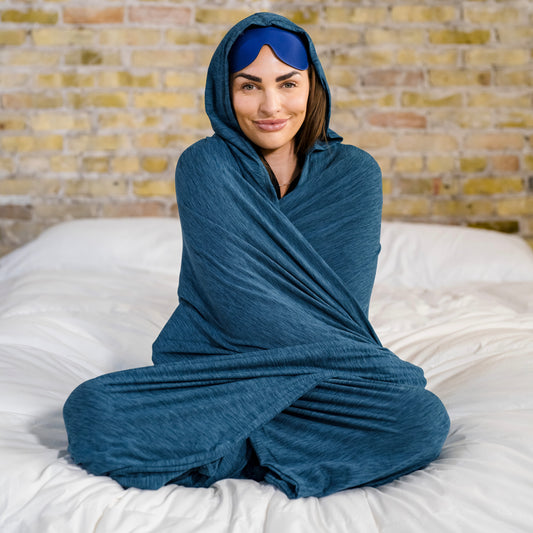


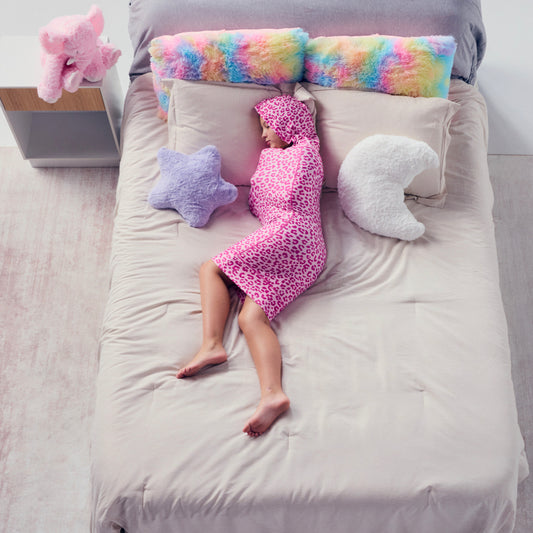

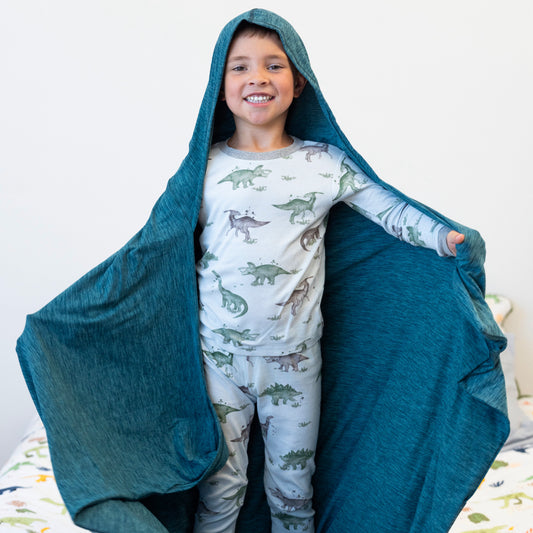
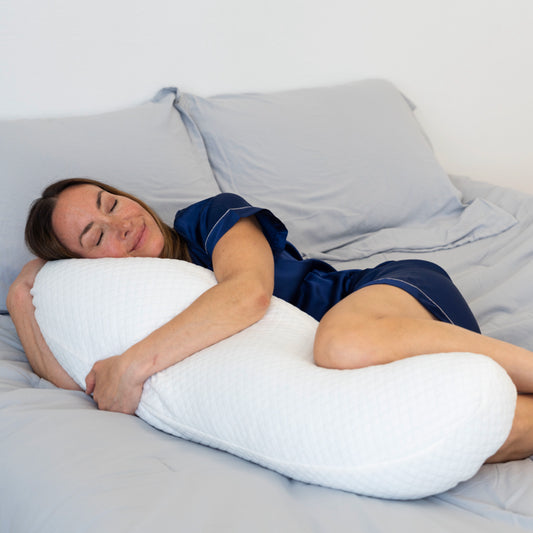
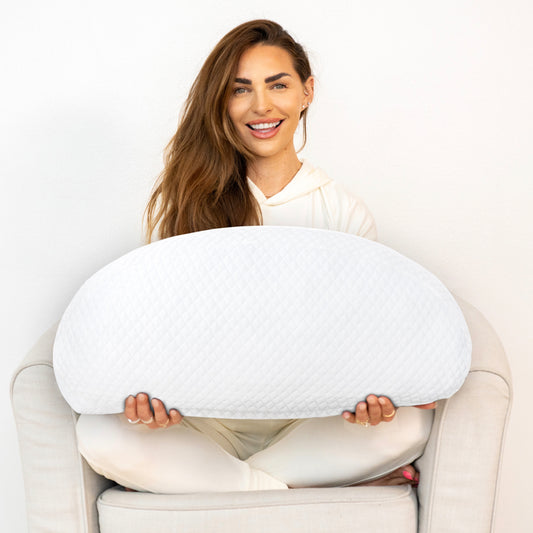
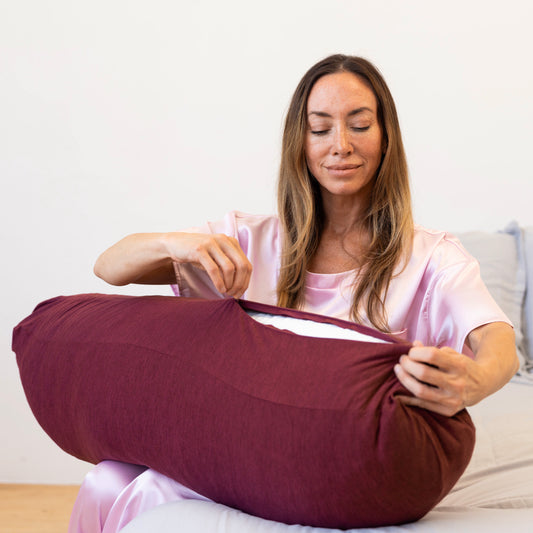
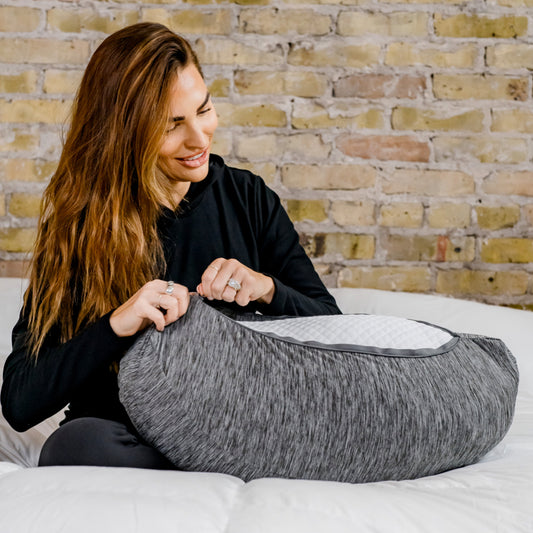
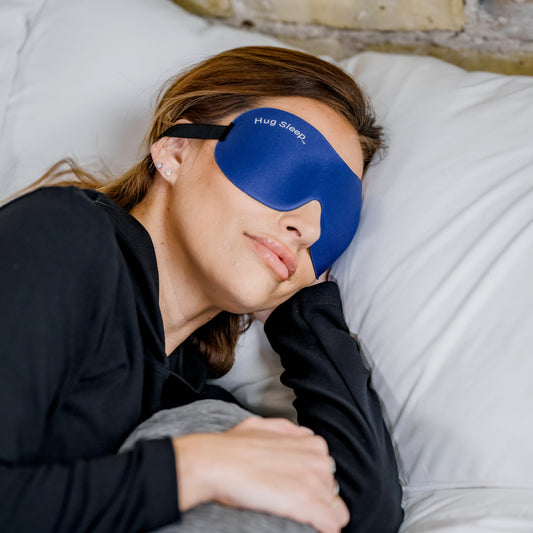
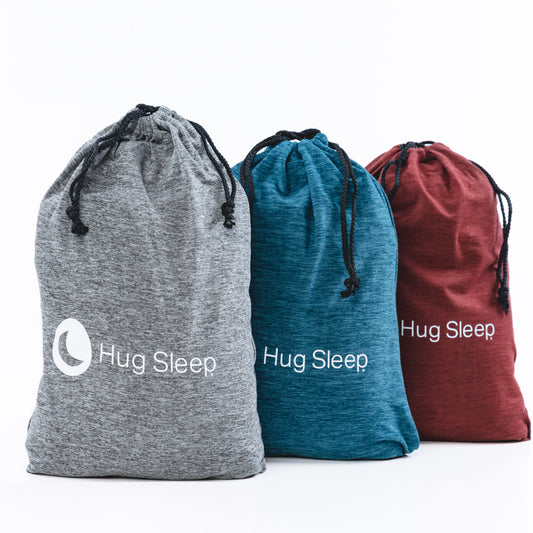


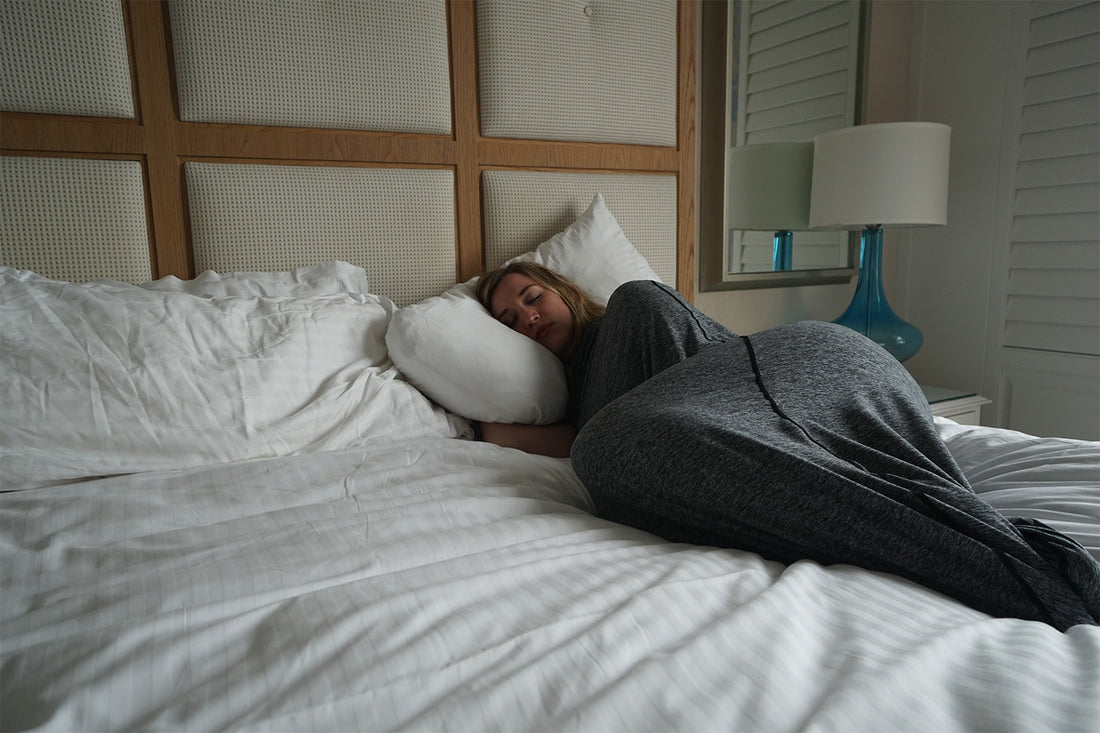









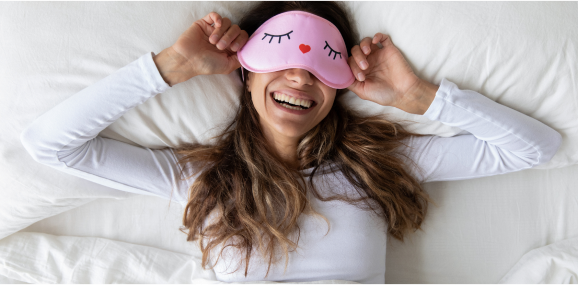
400,000+ happy customers